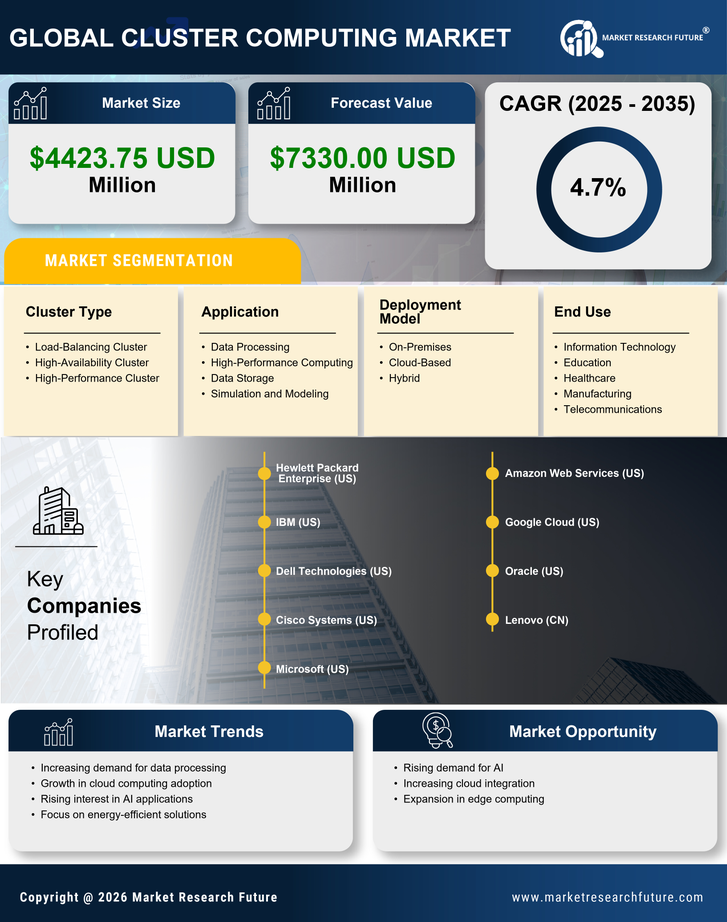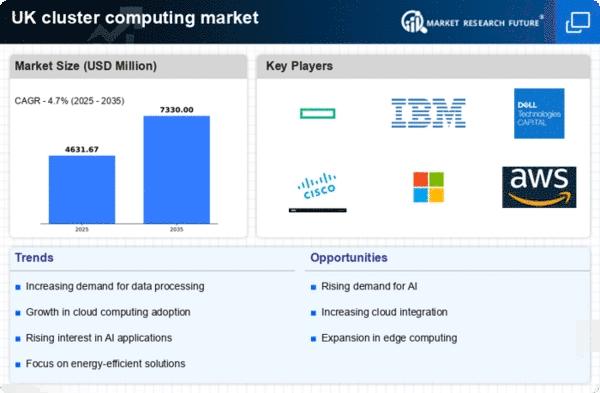Emergence of Edge Computing
The emergence of edge computing is influencing the cluster computing market in the UK, as organizations seek to process data closer to the source. This trend is particularly relevant for industries such as manufacturing and telecommunications, where real-time data processing is crucial. By integrating cluster computing with edge computing, businesses can enhance their operational efficiency and reduce latency. The market for edge computing is projected to grow significantly, with estimates suggesting a CAGR of around 15% over the next few years. This growth indicates a shift in how data is processed and analyzed, positioning the cluster computing market as a vital component in the evolving technological landscape.
Increased Focus on Cybersecurity
As cyber threats continue to evolve, the cluster computing market is witnessing an increased focus on cybersecurity measures. Organizations in the UK are prioritizing the protection of their data and computing resources, leading to a heightened demand for secure cluster computing solutions. The need for robust security protocols and infrastructure is becoming paramount, especially in sectors such as finance and healthcare, where data breaches can have severe consequences. The cybersecurity market in the UK is expected to reach £8 billion by 2025, indicating a strong correlation with the growth of the cluster computing market. This emphasis on security is likely to drive innovation and investment in secure cluster computing technologies.
Government Initiatives and Funding
the cluster computing market is supported by several government initiatives and funding programs aimed at enhancing technological capabilities in the UK. The UK government has been actively investing in research and development, particularly in the fields of artificial intelligence and data science. These investments are likely to create a conducive environment for the growth of the cluster computing market. For instance, funding schemes aimed at supporting innovation in computing technologies are expected to increase the adoption of cluster computing solutions among public and private sectors. This governmental support not only fosters innovation but also encourages collaboration between academia and industry, further driving the cluster computing market forward.
Expansion of Data-Driven Decision Making
In the current landscape, the cluster computing market is being propelled by the expansion of data-driven decision-making processes within organizations in the UK. Companies are increasingly leveraging big data analytics to gain insights and improve operational efficiency. The demand for cluster computing solutions is likely to rise as businesses require robust systems to handle large datasets and perform real-time analytics. Reports indicate that the analytics market in the UK is expected to reach £5 billion by 2026, further underscoring the importance of cluster computing in supporting these initiatives. As organizations strive to remain competitive, the reliance on cluster computing for data analysis and decision-making is anticipated to grow.
Rising Demand for High-Performance Computing
the cluster computing market is experiencing a significant increase in demand for high-performance computing (HPC) solutions across various sectors in the UK. Industries such as finance, healthcare, and scientific research are increasingly relying on HPC to process vast amounts of data efficiently. According to recent estimates, the UK HPC market is projected to grow at a CAGR of approximately 10% over the next five years. This growth is driven by the need for faster data processing capabilities and the ability to run complex simulations. As organizations seek to enhance their computational power, the cluster computing market is positioned to benefit significantly from this trend, as it provides the necessary infrastructure to support advanced computing tasks.

















